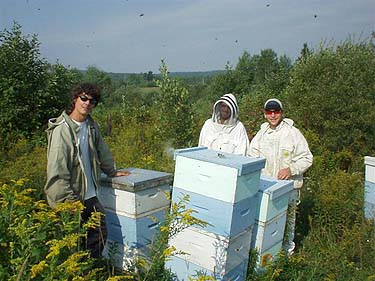Spring 2005, Marion County, South Carolina
In the late 1700’s Francis Marion, known as the legendary “Swamp Fox” of the Revolutionary War, came to this field high above the Blue Savannah Swamp. He and his troops surprised a much larger contingent of British solders, fired on them with their limited rounds, and then slipped back into the protection of the swamps along the Pee Dee River.

In December 2004, with our own idealistic mission to save the bees, against a formidable force, we spent weeks gathering the bees from the snowy lands of the North and brought truckloads 950 miles South to this same field and others along the Pee Dee River. Their future through the winter in the North was in question, weak from environmental stresses that has allowed mites and viruses to become more expressive. With smaller family populations, more colonies survive in the warmer days and nights of South Carolina, and with 60 days of additional Spring here, their families could then rebuild.
A miracle is now underway in these fields. As a phoenix in the glorious Spring days along the swamps of flowering tupelo trees and honeysuckle, Sam Comfort, with the help of Tim McFarline, are now orchestrating the revival of about 350 colonies of bees toward 1,000. Last week Sam wrote:
The mist is rising at our Blue Savannah beeyard, where I found myself early this morning moving in yesterday’s splits that will receive a queen cell today. With the approaching dawn I can begin to make out the slender oldfield toadflax flowers and the many variations of cress in this secluded, historic field. I know the bees have been drawing a lot of nectar from these fields lately, as well as the galberry and huckleberry lining this field. The swamp to the east is home to the tupelo trees, and when they bloom, the nectar will intensify even more.
The Honey Gardens’ bees are rebounding from coping with the varroa mite, and we are strictly following an organic treatment plan. We moved the hives south for a milder winter and an early escapade on this fabulous flower world. By raising our own queens and promoting mite resistant behavior, we can continue to avoid the chemical treatments that many beekeepers have caused bees to become dependent on. The mites have quickly grown resistant to chemical medicines. None of that is conducive to the Honey Gardens vision. A queen-rearing program supports our sustainability and the future of bees in Vermont. Reflecting on our important work and thinking of the good times to come this season, I pause and listen to the hum of the hives busily evaporating nectar into honey. I am so excited to once again be with the Honey Gardens team and take part in promoting the healthy future of our bees. Can’t wait to see those barn swallows out back in Vermont do their thing again!

High Laurentian Mountains, Northern Quebec
This work is supported by an international effort to save our bees. Many of our survivors have come from the bees raised by Anicet Desrocher’s organic bee farm in the High Laurentian Mountains of Northern Quebec. He has been raising queen bees that originally came from Russia, where bees have been found to be hygienic they clean the mites off of each other and kick them out of the hive. These beekeepers do not use chemicals. Mite-resistant queens have also come from Rick Shubert in California and other northern beekeepers. In his Amish carpentry shop, Dan Miller makes bee equipment without the aid of electricity. At the honeyhouse in Vermont, there is a dedicated crew putting equipment together for the bees in South Carolina. Our bees will return North in May, in time to visit the dandelion and apple flowers, and we look forward to their coming home, with Sam.
When you are in the Champlain Valley of Northern Vermont, it would be good to see you at our new honeyhouse. At 5335 Vermont Route 7, we are a few miles north of Vergennes and ½ hour south Burlington, close to and on the West/Lake Champlain side of Route 7. There is a retail shop here. After school our most honorable crew builds bee equipment, lemon yellow beeswax candles are made, and we are having some classes. Please call ahead to be sure we are here, tel. 802.877.6766, or if you are coming to Vermont contact us by e-mail or call the honeyhouse near Hinesburg (802.877.6766).
classes at the honey house
all on Saturdays starting at 10 AM:
beginning beekeeping with Sam Comfort and sale of nuc bee hives ~ May 14
Vermont elderberry project, release of two cultivars from the stock of Lewis Hill ~ July 23
The May issue of Organic Style magazine has great color pictures of our crew, bee yards and scenes around the honey house. It will be out within a few weeks.
Thank you all for your interest in and support of our bees and their work you give us courage.